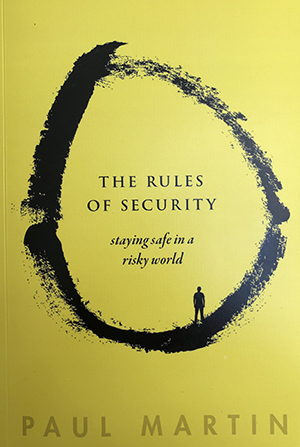Staying safe in a risky world
Security is the basis of civilised society. It is the practical discipline concerned with safeguarding lives, property, information, wealth, reputations, and social wellbeing. People, businesses, and nations cannot thrive in its absence, whereas the right kind of security frees us to live fulfilling lives.A new book, written by security expert Paul Martin, demystifies and explains the subject, which affects every one of us in our private lives and at work.

The threats to security are complex and continually evolving, as criminals, hackers, terrorists and hostile foreign states find new ways of staying one step ahead of their potential victims. At the same time, new vulnerabilities are created as new technologies and ways of working evolve and are adopted. Those who do not understand the fundamentals of security, risk and resilience open themselves, and those around them, to avoidable dangers, needless anxieties and unnecessary costs. Inadequate security may leave them exposed to intolerable risks, while the wrong kind of security is expensive, intrusive and ineffective.
In The Rules of Security, staying safe in a risky world, Martin sets out the ten most important guiding principles of protective security and resilience. Clearly expressed in the form of simple but powerful rules of thumb, their purpose is to help solve complicated problems for which there are no textbook solutions. The rules offer a toolkit that is designed to work in many different situations, including the cyber domain. When faced with novel problems requiring complex decisions, it is easy to focus on the wrong things. These rules are a reminder of what really matters.
The psychological and behavioural aspects of security are key themes throughout the book. In essence, people lie at the heart of security. The criminals, terrorists, and hackers are social animals with complex emotions and psychological predispositions. So too are the victims of those attackers and the security practitioners who strive to protect them. The human dimension is therefore crucial to understanding security.
The Rules of Security aims to help anyone with an interest in their own security and that of their home, family, business, or society. It also aims to be indispensable to those in positions of responsibility, allowing them to understand how best to protect their organisation, people, and assets.
The book, published by Oxford University Press (ISBN: 9780198823575), is out on May 16, 2019.
Paul Martin has also written an article based on the seventh rule of his book, concerning psychological predispositions and cognitive biases towards risks, which will feature in the next edition of Crisis Response Journal, published in June 2019.